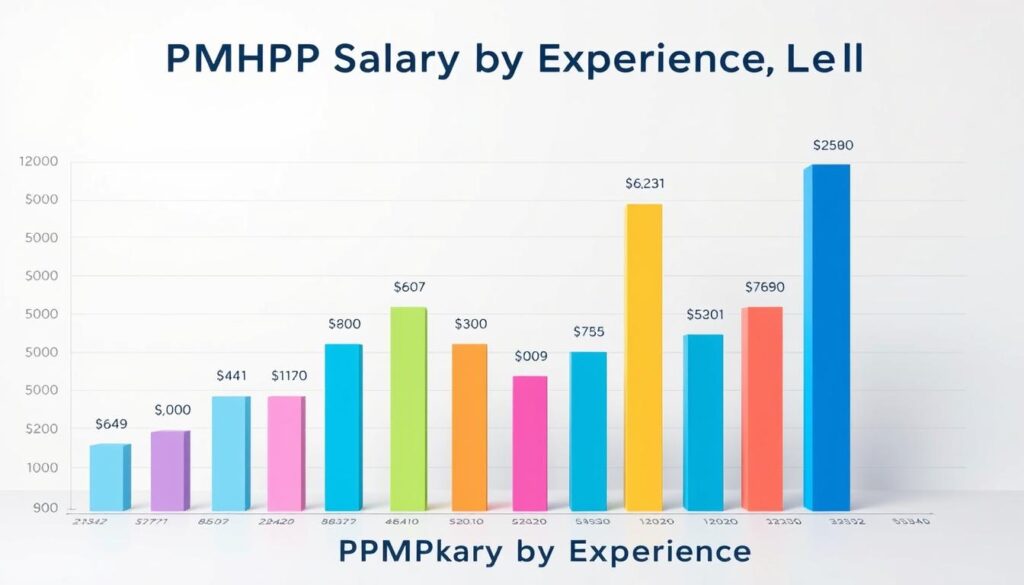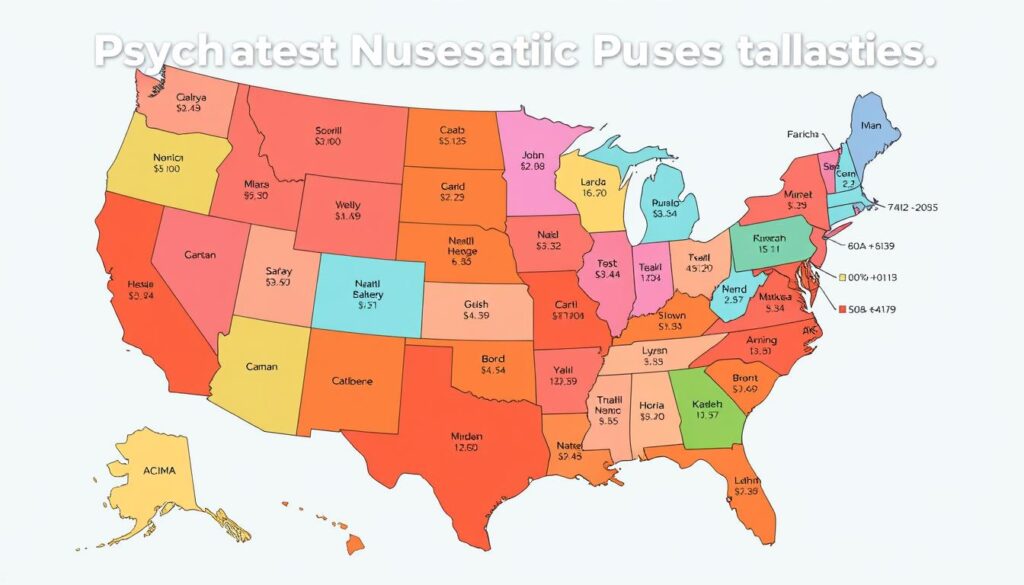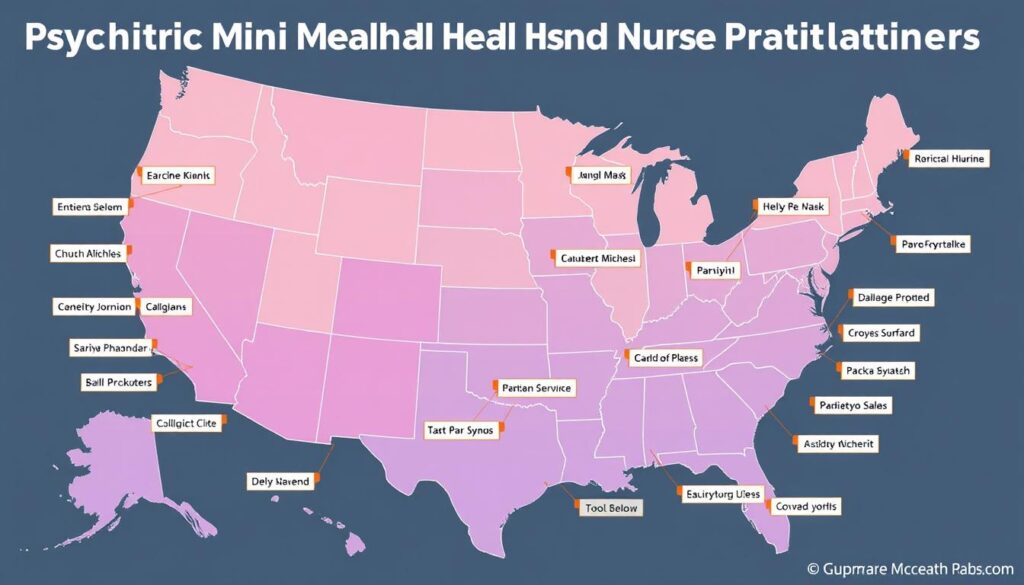Pursuing a career as a psychiatric nurse practitioner can be a rewarding and challenging profession. With the growing demand for mental health services, understanding the financial aspects of this career path is crucial.
According to recent data, the average psychiatric mental health nurse practitioner salary varies across different sources. Indeed.com reports an average annual salary of $155,182, while ZipRecruiter states that the average yearly salary is $90,554, with a range of $73,000 to $111,000 depending on location.
The U.S. Bureau of Labor Statistics also provides insight into nurse practitioner salaries, reporting an average annual salary of $129,480 for all specialties.
Key Takeaways
- Understand the average salary ranges for psychiatric mental health nurse practitioners across the United States.
- Compare psychiatric nurse practitioner salaries to other nursing specialties.
- Explore factors influencing PMHNP compensation, including location and experience.
- Gain insights into salary ranges across different states and cities.
- Discover strategies for increasing earning potential as a PMHNP.
What is a Psychiatric Mental Health Nurse Practitioner?
Psychiatric Mental Health Nurse Practitioners (PMHNPs) are advanced practice registered nurses specializing in mental health care. They provide comprehensive services to individuals, families, and communities affected by mental health issues.
Role and Responsibilities
PMHNPs assess, diagnose, and treat patients with various psychiatric disorders and mental health conditions. Their responsibilities include conducting therapy sessions, prescribing medication, and developing treatment plans for conditions like depression, anxiety, and bipolar disorder. For more information on the career path, visit AANP’s resource on becoming a PMHNP.
Education and Certification Requirements
To become a PMHNP, one must first be a registered nurse, then complete a Master’s or Doctoral degree in psychiatric mental health nursing. National certification is also required. The education pathway typically involves 2-4 years of graduate study beyond the BSN degree, with clinical rotations in mental health settings. Continuing education is necessary to maintain certification.
Average Psychiatric Mental Health Nurse Practitioner Salary Nationwide
The average psychiatric mental health nurse practitioner salary nationwide is a critical metric for understanding the compensation landscape for these specialized healthcare professionals. As the demand for mental health services continues to grow, understanding the average salary can provide insights into the financial aspects of this career path.
Current National Average Salary
The current national average salary for psychiatric mental health nurse practitioners reflects the high demand for their specialized skills. According to Indeed, the average psychiatric nurse practitioner salary is $149,061 per year. This figure is supported by data from the Bureau of Labor Statistics, which reports a median pay of $126,260 for nurse practitioners as of May 2023, although this data does not differentiate between various types of nurse practitioners.
Salary Range and Median Figures
The salary range for psychiatric mental health nurse practitioners nationwide varies significantly. ZipRecruiter reports an average yearly salary of $90,554, with a range of approximately $73,000 to $111,000, depending on the state and city. The median salary falls around $130,000 per year, with some figures reaching over $160,000. Factors such as location, experience, and work setting contribute to these variations.
It’s essential to consider that salary figures may or may not include benefits packages, which can significantly impact total compensation. The national average psychiatric nurse practitioner salary is influenced by the growing demand for mental health services and the specialized nature of their work.
Factors Affecting PMHNP Salary
Understanding the factors that affect PMHNP salary is crucial for both current and aspiring professionals. Several elements contribute to the variability in compensation for these healthcare specialists.
Education and Certification
The level of education and type of certification a PMHNP holds can significantly impact their salary. Advanced degrees and certifications, such as those from the ANCC or AANP, often lead to higher pay scales.
Experience Level
Experience level is another critical factor influencing PMHNP salary. Generally, the more years of experience a PMHNP has, the higher their earning potential, as employers often reward experience with incremental salary increases.
Workplace Setting
The workplace setting also plays a significant role in determining PMHNP salary. Different health care facilities and private practices offer varying levels of compensation, with some settings providing higher pay than others.
PMHNP Salary by Experience Level

As PMHNPs gain more experience, their earning potential increases substantially. The level of experience is a significant determinant of salary, with clear progression throughout a PMHNP’s career.
Entry-Level (Less than 1 Year)
Entry-level PMHNPs, those with less than one year of experience, can expect to earn an average annual salary of around $111,976. This is already competitive compared to many other healthcare professions.
Early Career (1-4 Years)
As PMHNPs gain 1-4 years of experience, their average annual salary increases to approximately $121,049. This rise reflects their developing clinical skills and expanding professional network.
Mid-Career (5-9 Years)
PMHNPs with 5-9 years of experience earn an average annual salary of about $125,755. At this stage, their growing expertise and ability to handle more complex cases are key factors in their salary growth.
Experienced (10-19 Years)
With 10-19 years of experience, PMHNPs can command salaries averaging $129,307. Their extensive clinical knowledge and potential supervisory roles contribute to this higher earning potential.
Late Career (20+ Years)
PMHNPs with 20+ years of experience reach the peak of the pay scale, earning an average annual salary of $131,615. Additional specializations or leadership positions can further enhance their earnings.
The salary progression for PMHNPs is clear: as experience grows, so does the annual salary. This trend underscores the value of experience in the field.
| Experience Level | Average Annual Salary |
|---|---|
| Less than 1 year | $111,976 |
| 1-4 years | $121,049 |
| 5-9 years | $125,755 |
| 10-19 years | $129,307 |
| 20+ years | $131,615 |
Top-Paying States for Psychiatric Nurse Practitioners

Several states in the U.S. are recognized for offering the highest salaries to psychiatric nurse practitioners, making them attractive locations for professionals in this field. These states typically feature higher salaries due to factors such as cost of living, strong healthcare systems, and progressive scope-of-practice laws for nurse practitioners.
California
California is a fantastic place to practice as a PMHNP, with its warm climate and endless outdoor adventures. The average salary is $157,460 per year.
Alaska
Alaska offers a unique lifestyle with breathtaking wilderness and various outdoor activities. PMHNPs here earn an average of $155,430 yearly.
Hawaii
Hawaii provides competitive salaries averaging $152,270 annually, along with a high quality of life and diverse practice opportunities.
Massachusetts
Massachusetts is renowned for its top psychiatric hospitals and research institutions, offering an average salary of $149,220 for PMHNPs.
New York
New York ranks among the top five highest-paying states with an average psychiatric nurse practitioner salary of $145,590, particularly in metropolitan areas.
Lowest-Paying States for Psychiatric Nurse Practitioners
Despite the growing demand for mental health services across the United States, certain states consistently offer lower salaries for psychiatric nurse practitioners. According to ZipRecruiter, the lowest-paying states for psychiatric nurse practitioners include Florida, West Virginia, Arkansas, Georgia, and Kentucky.
The average salaries in these states are as follows:
- Florida: $73,466 annually
- West Virginia: $76,108 annually
- Arkansas: $81,292 annually
- Georgia: $83,011 annually
- Kentucky: $85,384 annually
Let’s take a closer look at the salaries in these states:
Florida
Florida ranks as one of the lowest-paying states with an average annual salary of approximately $73,466, despite having a large population and significant mental health needs.
West Virginia
West Virginia follows with salaries averaging around $76,108 annually, reflecting the state’s overall lower healthcare wages and economic challenges.
Arkansas
Arkansas psychiatric NPs earn approximately $81,292 on average, substantially below the national average despite the critical need for mental health providers in rural areas.
Georgia
Georgia offers salaries averaging $83,011, which is significantly lower than neighboring states in the Southeast.
Kentucky
Kentucky rounds out the five lowest-paying states with an average salary of $85,384 for PMHNPs.
Highest-Paying Cities for Psychiatric Nurse Practitioners

The salaries for Psychiatric Mental Health Nurse Practitioners vary significantly across different cities, with some metropolitan areas standing out for their exceptionally high pay. Metropolitan areas typically offer the highest salaries for psychiatric nurse practitioners, with some cities providing annual compensation well above the national average.
San Francisco, CA
San Francisco and surrounding Bay Area cities in California consistently rank among the top-paying locations, with salaries ranging from $160,000 to over $165,000 annually.
Chattanooga, TN
Surprisingly, Chattanooga, Tennessee has emerged as a leading city for PMHNP compensation, offering an impressive average salary of $232,909 according to recent data.
Baltimore, MD
Baltimore, Maryland provides psychiatric nurse practitioners with competitive pay averaging $220,652, reflecting the city’s robust healthcare system and numerous academic medical centers.
Portland, OR
Portland, Oregon offers attractive salaries averaging $209,260, combined with a high quality of life and progressive mental health initiatives.
Seattle, WA
Seattle, Washington ranks among the top-paying cities with average salaries around $202,865, supported by the region’s strong healthcare infrastructure.
PMHNP Salary by Work Setting
Different work settings offer distinct salary ranges for PMHNPs, reflecting the diverse nature of their roles. The type of healthcare facility or organization a PMHNP works for can significantly influence their compensation.
Hospitals and Psychiatric Facilities
PMHNPs working in hospitals and psychiatric facilities typically receive mid-range salaries, averaging between $125,000 and $140,000 annually. These settings provide a structured environment and comprehensive benefits packages.
Private Practice
Private practice settings often yield the highest earning potential for PMHNPs, with some practitioners earning between $150,000 and $200,000 annually. Specialized treatment approaches or serving high-need populations can further enhance earning potential.
Community Mental Health Centers
Community mental health centers generally offer lower salaries, ranging from $100,000 to $120,000. However, they may provide loan forgiveness programs and the opportunity to serve vulnerable populations.
Correctional Facilities
Correctional facilities compensate PMHNPs well, with salaries averaging $130,000 to $145,000, reflecting the challenging nature of providing mental health care to incarcerated patients.
The following table summarizes the average salary ranges for PMHNPs in different work settings:
| Work Setting | Average Salary Range |
|---|---|
| Hospitals and Psychiatric Facilities | $125,000 – $140,000 |
| Private Practice | $150,000 – $200,000 |
| Community Mental Health Centers | $100,000 – $120,000 |
| Correctional Facilities | $130,000 – $145,000 |
Understanding the salary ranges in different work settings can help PMHNPs make informed decisions about their career paths.
Benefits and Compensation Packages
A critical aspect of evaluating PMHNP positions is understanding the full scope of benefits and compensation offered. Beyond the salary, these benefits can significantly enhance the overall value of a job offer.
Health Insurance and Retirement Benefits
Comprehensive health insurance is a standard benefit for PMHNPs, often including medical, dental, and vision coverage. Retirement benefits typically involve 401(k) or 403(b) plans with employer matching contributions, enhancing long-term financial security.
Paid Time Off and Work-Life Balance
Paid time off policies vary among employers, with most offering 3-5 weeks of vacation annually, plus sick leave and holidays. Work-life balance is further supported by flexible scheduling and reasonable on-call expectations.
Education and Certification Reimbursement
Many employers offer reimbursement for continuing education and certification renewal fees. Some also provide tuition reimbursement for advanced degrees, supporting career advancement.
As noted by a healthcare professional,
“The benefits package can make or break a job offer. It’s not just about the salary; it’s about the overall compensation and how it supports your career and personal well-being.”
| Benefit | Typical Offering | Variability |
|---|---|---|
| Health Insurance | Comprehensive coverage | Employer contribution levels |
| Retirement Plans | 401(k) or 403(b) | Matching contribution rates |
| Paid Time Off | 3-5 weeks vacation | Additional sick leave and holidays |
How to Increase Your PMHNP Salary

Psychiatric nurse practitioners can significantly increase their earnings with the right strategies. To achieve this, it’s essential to be open to new opportunities and willing to adapt.
Advanced Certifications and Specializations
Pursuing advanced certifications and specializations is a viable method to increase your psychiatric nurse practitioner salary. Specializing in areas like addiction medicine or psychotherapy techniques can boost your salary by 5-15%. Many employers offer salary increases for certification in specialized areas.
Negotiation Strategies
Developing strong negotiation strategies is crucial for maximizing your compensation. This includes researching market rates, documenting your achievements, and timing discussions around performance reviews. Effective negotiation can lead to a significant increase in your nurse practitioner salary.
Changing Work Settings or Locations
Strategically changing your work setting or location can substantially impact your practitioner salary. Private practices and specialized facilities often offer higher compensation compared to community health centers. Additionally, relocating to high-paying states or metropolitan areas can result in annual salary increases of $20,000-$50,000.
Moving into Leadership Roles
Moving into leadership roles such as clinical director or program manager can lead to significant salary increases of 15-25% over standard clinical positions. Pursuing additional education, such as a DNP or PhD, can also open doors to higher-paying academic, research, and executive positions, thereby enhancing your job prospects and salary.
Job Outlook for Psychiatric Nurse Practitioners

Employment opportunities for psychiatric nurse practitioners are expanding rapidly. According to the U.S. Bureau of Labor Statistics (BLS), the career outlook for NPs is excellent, with a predicted 46% growth in employment from 2023 to 2033, much faster than the average for all occupations.
Growth Projections
The job outlook for psychiatric nurse practitioners is exceptionally strong. The BLS projects a significant growth in NP employment, with psychiatric specialists being in high demand. Approximately 25,025 NPs, or 6.5% of all practicing NPs, are certified in psychiatric mental health.
| Occupation | Growth Rate (2023-2033) | Current Number |
|---|---|---|
| Nurse Practitioners | 46% | Approximately 385,000 |
| Psychiatric Mental Health NPs | High Demand | Approximately 25,025 |
Demand Factors
Several factors contribute to the high demand for psychiatric nurse practitioners. These include the shortage of psychiatrists nationwide, increased mental health awareness, and the integration of mental health services into primary care settings. The ongoing mental health impacts of the COVID-19 pandemic and government initiatives supporting mental health services further drive this demand.
Key demand factors include mental health awareness, reduced stigma, telehealth expansion, and government initiatives. These factors have created a favorable job market with numerous opportunities for psychiatric nurse practitioners.
Conclusion
With their specialized education and critical role in addressing the nation’s mental health needs, psychiatric mental health nurse practitioners enjoy competitive compensation. The average psychiatric nurse practitioner salary nationwide ranges from approximately $126,000 to $149,000, with significant variations based on factors such as location, experience, and work setting.
Health nurse practitioners in this specialty can increase their earning potential through strategic career moves, additional certifications, and leadership positions. The robust job outlook for mental health professionals suggests that salaries will continue to rise as demand outpaces supply.
When evaluating career opportunities, nurse practitioners should consider the total compensation package, including benefits, work-life balance, and professional development opportunities. As the healthcare system recognizes the importance of mental health integration, psychiatric nurse practitioners will remain valued members of the healthcare team.
FAQ
What is the average annual salary for a Psychiatric Mental Health Nurse Practitioner in the United States?
The average annual salary is around $145,000, but it can vary based on factors like location, experience, and work setting.
How does experience level impact salary for PMHNPs?
More experienced PMHNPs tend to earn higher salaries, with those having 10-19 years of experience averaging around $160,000 per year.
Which states offer the highest salaries for PMHNPs?
Top-paying states include California, Alaska, Hawaii, Massachusetts, and New York, with average salaries ranging from $170,000 to over $200,000 per year.
What are the benefits and compensation packages typically offered to PMHNPs?
Benefits often include health insurance, retirement plans, paid time off, and reimbursement for education and certification expenses.
How can PMHNPs increase their salary?
Obtaining advanced certifications, negotiating salary, changing work settings or locations, and moving into leadership roles can help increase earning potential.
What is the job outlook for PMHNPs?
The demand for PMHNPs is expected to grow significantly due to the increasing need for substance abuse treatment and mental health services.
What work settings offer the highest salaries for PMHNPs?
Hospitals, psychiatric facilities, and private practices tend to offer higher salaries compared to community mental health centers or correctional facilities.
How does education and certification impact PMHNP salary?
Having a master’s or doctoral degree and obtaining certification can lead to higher salaries and greater job opportunities.

